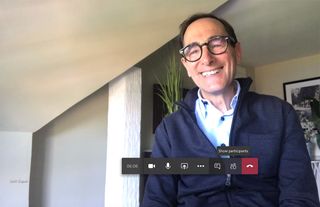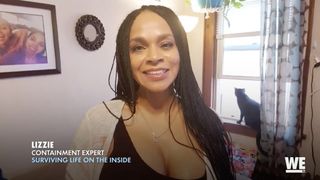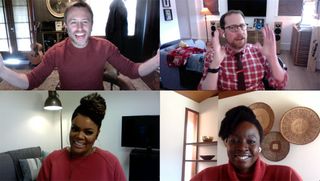View from the Top: AMC CEO Sapan’s Work-From-Home Watchword Is Overcommunicate
As president and CEO of AMC Networks, Josh Sapan has profited from a fictional zombie apocalypse. Now he must manage through a historic pandemic and he says his watchword is to “overcommunicate” with staffers during these tense times.

Like others in the media business, Sapan is away from the office, working from home and finding little tricks to help him do his job and keep the company on track.
The company recently reported a 52% decline in first-quarter earnings and said it expected ad revenue to be down about 30% in the second quarter. The upside was that AMC’s targeted streaming services are expected to get to between 3.5 million and 4 million subscribers by the end of the year, a milestone the company didn’t expect to reach until 2022.
Sapan sees some good coming from this catastrophe, including new ways of producing shows and new platforms for companion programming.
He sat down in his home office and did an interview over Windows Meet with Multichannel News. Here’s a recap of the conversation.
MCN: Where are you working from these days?
Josh Sapan: I’m working from a place called Shelter Island, New York. I’ve had a house here for 20-plus years and I’m in the attic-ish part of it, which is remote from the rest of the house.
Multichannel Newsletter
The smarter way to stay on top of the multichannel video marketplace. Sign up below.
MCN: Did you used to use that spot when you were working from home or is it a new office space?
JS: I didn’t spend much time here. It’s a little warm
in the warm weather. But I’m up here now and I
have three screens with three keyboards and two telephones, all charging simultaneously.
“I miss the elements that caused us not to be very efficient. I miss the human, open-ended dialogue with people that I passed in the hallway.”
MCN: Is that stuff that was brought in in early March?
JS: Yes. I’ve always had two telephones. And I’ve always had an iPad, but I brought an iPad from work and I also got a laptop because we’re doing Microsoft Teams and Zoom. Our IT group was phenomenal. Not just for me, but for everybody.
MCN: What part of working remotely surprised you the most?
JS: I would say a couple of things. One is the work ethic and the hard work of everyone. People are perhaps working harder and longer than they did. I think that we have to be careful with it. There is no demarcation or not much between personal time and work time. And that’s quite something, especially for people with kids at home who are doing remote learning and need attention.
I’m surprised that this has actually increased everyone’s punctuality. People aren’t late and I think the economy or efficiency of time has perhaps improved.
MCN: What do you miss about working from
an office?
JS: I miss the elements that caused us not to be very efficient. I miss the human, open-ended dialogue with people that I passed in the hallway. It’s a peculiar practice, but I try to arrive at different floors in our office on different days in order to see different people and just interact with them occasionally. So I work on the 18th floor, but I’ll go to the 19th floor, which is the main entrance to our office, and say hello to the woman who is at the front desk there, Jeanine [Holmes]. And I’ll go to other offices and say hello to people who are there. You develop patterns of conversation. They’re not intimate, but they’re fun and they’re human and they have a nice quality of walking down the street and living in a town and I do miss that sort of terribly.
MCN: Are you able to collaborate with your top executives?
JS: Yeah. I’d like to think very much. We have perhaps instituted a more vigorous and more regular sequence of meetings. So we have a senior leadership team twice a week, those are eight people. I have regular catch-ups with direct reports that are on a very regular basis. We have senior staff meetings, as we always did, with a group of 25. There’s a whole protocol of meeting, as anyone would have. We just last week did our first virtuaI check-in meeting with 1,500 participants across the globe. I had to move my laptop downstairs, by the way, because I didn’t want to be on wireless just because of the possibility of it being hinky, and so it was hard-wired into the router.

MCN: How do you maintain communication with the entire company?
JS: I think our watchword has been overcommunicate, and our talent and people have been leading that. So we really are trying to acknowledge that when people are at home and not receiving both social information and familiarity of being where they are. Also, it’s a peculiar time, of course, because as a pandemic and they’re undergoing in some cases challenging personal circumstances related to people near them who have health issues or, and not a small thing, the burden on people who normally rely on external resources to help with people who they are caring for, or children. When that’s gone, I think that they need and would like more communication from the company. So we’ve been attempting to make sure that we fill that with, I call it overcommunication. It may not be “over.” It is over compared to what we normally did in the past.
MCN: Has your style of leadership changed?
JS: I think by degree. Certainly for this circumstance. Yes, and at least my attempt has been to be more communicative, even if there’s not specificity in what will happen with returning to workplaces when it does. There’s ambiguity surrounding that, for very obvious reasons, and that creates concern on behalf of people with about where they will be when, what their kids will be doing, who they’ll be helping to educate, whether their kids will be at camp, et cetera, et cetera. So I would say that for this circumstance, I have been attempting to follow behaviors that are helpful. I think there’s a different set of behaviors that are better suited for this circumstance than for others.
MCN: What’s new in your daily routine?
JS: What’s new in my daily routine is that thermoses have overtaken my life. I think it’s because they stay hot, they stay cold and they don’t need refilling. It’s terribly sedentary. If I have individual calls, I try and do them outdoors and make that a part of work. I’m able to walk an average of at least 10 miles a day, usually on work calls. I’ve got this [he shows a notebook he carries in his back pocket] and I use wireless headphones. I bought a backup pair assuming I would at least lose one pair somewhere along the way. There’s good cell service here. It’s not that heavily populated an area. So it’s very accommodating but it allows at least for some ventilation.
MCN: Any other habits?
JS: I have found that my thumb hits Speedtest like an addict. I’ve done Speedtest on multiple devices and what I expect to get out of it, I don’t know. But when I hit 225 megabits, a feeling of plentitude comes over me. It’s a gateway drug to checking megabits up and down.
MCN: What part of the business has been most affected by this crisis?
JS: Production, obviously, is ceased and that’s meaningful for us. I think that’s had a couple of interesting consequences. The obvious is we don’t have new shows for when they’re planned. That affects our advertising.
It’s also breathed some oxygen into new forms and formats. Our Talking Dead shows are from home. So we’ve done other home shows that some of which have been surprisingly good. Jeffrey Dean Morgan is doing Friday Night In with the Morgans. His wife was on One Tree Hill. She was an MTV VJ. She’s charming. They live in upstate New York and they’ve had all sorts of people on their shows.
Love After Lockup is a big hit. Those people really know what isolation’s like, so they’ve done material from home, which has been pretty interesting.

I actually think we’re going to find increasingly new flavors and forms and formats of adjacent content. I have a 24-year-old who’s home, so I observe her behavior and not surprisingly she’s on platforms, and so I’m spending more time on Twitch. I’m spending more time on TikTok. And we’re using those platforms as companions for our content, and I think they’re spectacular companions for our content. I think that’s something that will emerge as something that is much more common in the future. If you look at the followers, they’re monstrous numbers, and so talent going on TikTok is certainly something that’s on my mind because it creates very instant activity among a specific demo.
The other one that’s meaningful for us is our subscription services have grown dramatically on a percentage basis. That’s very good news for us. Not only have they grown, but engagement has grown, meaning people are using them a lot more. That’s a function of the circumstance, but it’s quite encouraging.
MCN: How will content change? Will we stop seeing shaking hands, hugging and crowded offices in shows?
JS: When there are meaningful chaotic world events, from 9/11 to the Vietnam War to Iraq, Afghanistan, etc., it always seems to me like it takes a period of time for them to be digested and understood and reflected upon. It does seem like there’s a gestation period for understanding and almost one needs a distance to reflect it well. The other odd thing is that there’s so much on the screen that has a dystopian narrative that’s become sort of prescient. I find people trying to explain to me how they feel using movie and TV references and they say, ‘It’s like an episode of blank.’
MCN: Is there anything you’re doing now that you’ll continue to do once offices reopen?
JS: I do think there have been some cues about the efficiency of remote communications that are undeniable. They can be highly, highly efficient. I also think that the potential of production efficiencies, and the acceptability and interest in, to use an overused word, “authentic” expression from home where you’ll see your kid, you’ll see your dog accidentally, has a sort of relevance that we’ve seen in user-generated content. There will be new flavors and forms of communication that arise from it. They may be adjuncts to the central story, but they also may emerge more significantly as interesting things of their own. λ
Jon has been business editor of Broadcasting+Cable since 2010. He focuses on revenue-generating activities, including advertising and distribution, as well as executive intrigue and merger and acquisition activity. Just about any story is fair game, if a dollar sign can make its way into the article. Before B+C, Jon covered the industry for TVWeek, Cable World, Electronic Media, Advertising Age and The New York Post. A native New Yorker, Jon is hiding in plain sight in the suburbs of Chicago.

